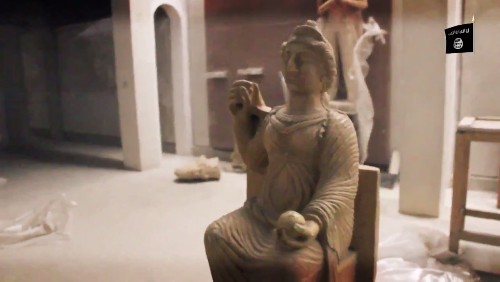Militants of the Takfiri group, ISIL, are not attacking ancient monuments in Iraq and Syria with jackhammers and bulldozers, but they also have been quietly selling off smaller antiquities, The Washington Post reported on Monday.
Militants of the Takfiri group, ISIL, are not attacking ancient monuments in Iraq and Syria with jackhammers and bulldozers, but they also have been quietly selling off smaller antiquities, The Washington Post reported on Monday.
The daily quoted officials and experts as saying that ISIL has been “earning millions of dollars in an increasingly organized pillaging of national treasures.”
“The group’s looting has become so systematic that the ISIL has incorporated the practice into the structure of its self-declared caliphate, granting ¬licenses for digging at historic sites through a department of “precious resources.”
The extremist group’s recent capture of Syria’s majestic 2,000-year-old ruins at Palmyra threw a spotlight on the risk that the ISIL poses to the region’s rich cultural heritage, the paper said.
Palmyra is, however, just one of 4,500 sites under the group’s control, the daily added according to the Paris-based Financial Action Task Force.
“They steal everything that they can sell, and what they can’t sell, they destroy,” said Qais Hussein Rasheed, Iraq’s deputy minister for antiquities and heritage.
“We have noticed that the smuggling of antiquities has greatly increased since last June,” he added, referring to the month in which Islamic State militants took control of Mosul and large parts of northern Iraq.
The ISIL’s plundering began in a haphazard fashion when the extremists first gained a foothold in Syria. But the trade has become more organized as the group has conquered territory.
The ISIL grants licenses for the excavation of ancient sites through its “Diwan al-Rikaz” — a governing body for overseeing resources in the “caliphate,” the Washington Post noted, adding that the body has a department for oil and gas, as well as antiquities, documentation from the group shows.
The ISIL “has incorporated the activity of excavation into its bureaucracy,” said Aymenn al-Tamimi, a researcher on jihadist groups at the Britain-based Middle East Forum who has compiled an archive of ISIL administrative documents.
How much the ISIL earns from the trade is difficult to estimate. Iraqi officials say it is the group’s second most important commercial activity after oil sales, earning the militants tens of millions of dollars, the report said.